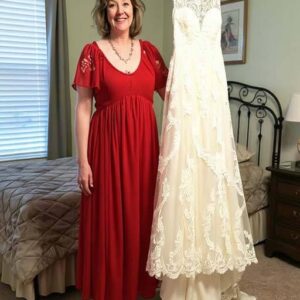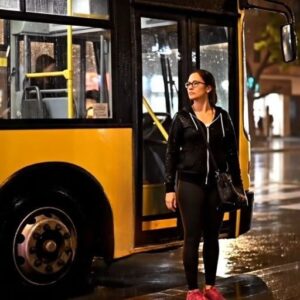I was meant to be off the clock. After working two shifts back-to-back, visiting the hospital again was the last thing on my mind. But Alina, one of the nurses, caught me just as I was departing—her expression grave and her tone hushed. “Officer Medina, could you quickly meet someone? She’s been asking for you.”
I nearly refused. My energy was completely drained. Then she said the girl’s name—Noor. We’d met once during a standard community visit to the children’s ward. She was probably seven years old, with slender limbs and large brown eyes, constantly asking questions about my badge. When I entered her room, her face brightened as if I’d brought her the entire universe. Her mother gave me a weary smile, like she hadn’t smiled in quite some time.
Noor pulled my sleeve, asking quietly, “Can I sit in your police car? Just once?”
I looked at her IV drip, listened to the equipment buzzing behind her, and felt something break inside me. Thoughts of regulations raced through my mind—insurance issues, legal responsibilities, administrative headaches—but they seemed unimportant at that moment. I glanced toward Alina. She gave a slight nod, as if she anticipated my decision before I made it.
I chose to act.
I told Noor and her mother to stay put, rushed to the parking area, and discreetly moved the patrol car to the side entrance. No flashing lights, no wailing alarms. Just the three of us, and one ride. What surprised me was who appeared just as I was securing Noor in the front seat—someone unexpected.
A thin man, possibly in his late twenties, approached hastily with a baseball cap pulled down over his brow. His eyes were wary, and he held a small paper bag against his chest. Initially, I thought he might be a concerned family member from the children’s department. But the way Noor’s mother tensed, pressing her lips together, indicated there was a backstory.
“Cristian,” she said, barely audibly. Noor shifted her gaze from her mother to the man. “Papa?”
That’s when I understood this was Noor’s father—one who evidently hadn’t been present recently. The mother’s grip tightened on the metal handle of the wheelchair we’d used to bring Noor outside. She appeared conflicted between wanting to shield her daughter and allowing a father to see his child.
I hadn’t encountered Cristian before, but during my first hospital visit, I’d heard pieces of Noor’s story. Something about her dad being gone, financial struggles, and her mom fighting continually to maintain Noor’s happiness. Whatever had transpired between them, I could see the situation was difficult.
He hesitated, looking at me, then the patrol vehicle, then back to Noor. “I… I simply wanted to deliver this,” he stated, raising the paper sack. “It contains some coloring books, a stuffed toy, and… well, I heard Noor would be here longer than planned.”
Noor’s gaze sparked with interest. She partially rose in the passenger seat of my police car, the safety belt half-secured, unsure whether to remain or exit.
I reminded myself I shouldn’t interfere in family matters. I’d already exceeded my duties by setting up this brief ride. But when Noor asked, “Papa, will you stay?” her expression made everything clear: this wasn’t just a brief appearance. This moment was significant.
Her mother sighed, the stiffness in her shoulders gradually easing. “He came unexpectedly yesterday,” she told me quietly. “He wants to assist now. I… I’m uncertain.”
I’d witnessed enough families split apart by minor errors that grow into major regrets, so I decided to withhold judgment. “We’ll just move around the parking area, very slowly,” I informed Cristian and Noor’s mother. “You can wait for our return by the side entrance if you prefer.”
Cristian shook his head. “May I join? Perhaps… in the rear seat?”
He spoke as if fearing rejection, but I couldn’t ignore the expectation in his voice. After checking with Noor’s mother—who shrugged and gave a cautious nod—I opened the back door. “It’s not particularly comfortable back there,” I cautioned with a slight smile.
Nevertheless, Cristian entered with respectful quietness, as if it were the finest seat available.
I drove very slowly, just circling the hospital driveway and the nearly vacant visitor parking. Noor laughed when I turned the wheel and contacted dispatch with my position (I didn’t reveal I had a very special passenger). She kept inquiring: “Do you arrest criminals? Do you work with a police dog? Can I activate the lights?”
Cristian, from the back, had questions too: “Officer Medina, how is Noor really doing? Honestly… how is she?”
I observed him in the rearview mirror. “She’s resilient,” I replied, answering carefully. “She’s undergone some difficult treatments, from what I understand. But she’s feeling somewhat better today.”
Noor agreed proudly, as if determined to demonstrate it. “I’m tough,” she announced. “Tough like Mama. Tough like Papa was before.” She said the final part more softly, glancing back at him.
Cristian extended his hand toward the mesh barrier. He couldn’t quite reach Noor, but he placed his palm against the metal. “I want to fix everything,” he said, his voice strained with feeling.
I realized then that life sometimes denies us second opportunities, and sometimes grants them. Here he was, attempting to repair a significant breach in his family. And the child, so welcoming, was prepared to excuse. I wished for their benefit it might succeed. We returned to the entrance after several gradual circles. Noor’s face was pink with thrill. She refused to unfasten her belt. “Can we continue?” she requested.
I checked the time display on the dashboard. I was certainly accumulating additional hours at this point, and I wasn’t sure what my supervisor would think if he discovered this. But one glance at those large brown eyes, and I yielded.
“Only once more,” I agreed.
Noor released a loud celebration, and this time I switched on the lights briefly, brightening the dimming evening air. The glow twinkled in her gaze. By the time I stopped again, however, she appeared tired from the exhilaration, her tiny fingers clutching the strap as if reluctant to depart. Her mother assisted her out of the seat into the wheelchair, while Cristian exited from the rear.
“Thank you, Officer,” Noor’s mother murmured.
Cristian cleared his throat, and I noticed him gather some bravery. “If it’s acceptable, I’ll accompany you both back inside,” he proposed softly. The mother remained cautious—her expression indicated faith wouldn’t be gained immediately. But she consented, and the trio proceeded in, Cristian carefully guiding Noor’s wheelchair, the paper bag of presents balanced on her knees. I saw her peeking inside, her expression brightening at the stuffed toy, embracing it against her chest.
I stayed by my police car, experiencing a surge of happiness I hadn’t felt in many months. Despite my fatigue, I recognized something meaningful had just occurred—a minor advance toward mending a family. Perhaps it wouldn’t resolve everything, but it marked a beginning.
I didn’t receive news from Noor’s family for nearly two weeks. My work hours accumulated, and I became occupied with midnight patrols in distant parts of town. But occasionally, I would think about her, curious if she was improving.




